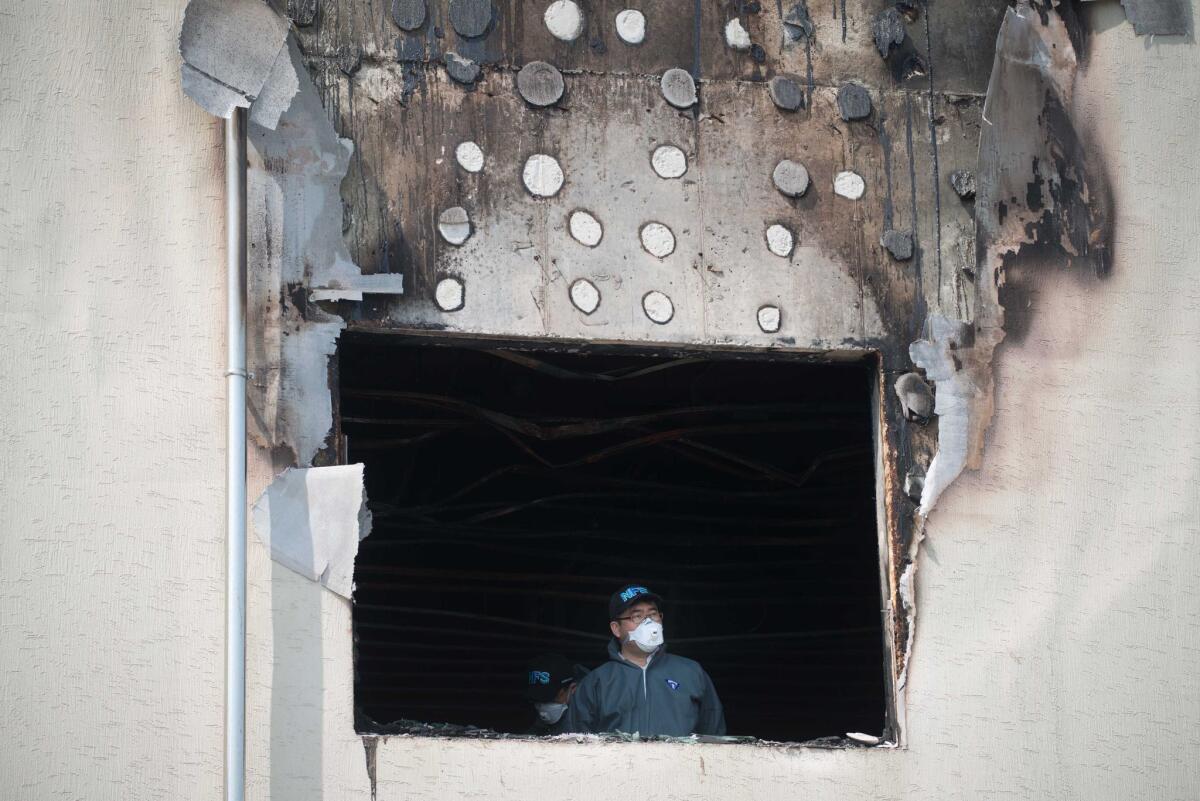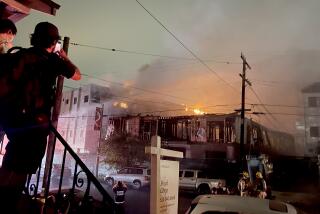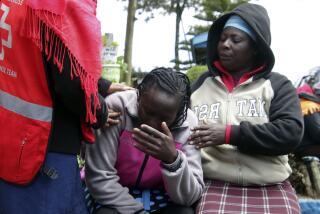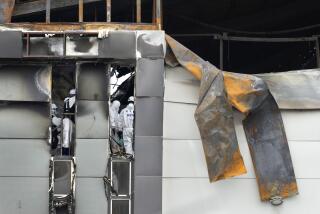Fire at South Korean nursing home leaves 21 dead

Reporting from Seoul â A fire broke out at a nursing home in South Korea early Wednesday, leaving 21 dead and 8 injured, the latest in a series of high-casualty incidents.
The fire took place overnight in Jangseong, a few hours south of the capital, Seoul. The semi-official Yonhap News Agency reported that an 82-year-old man was detained for questioning on suspicion of arson.
The Hyosarang (âFilial Loveâ in Korean) nursing home reportedly has 320 residents, including elderly people suffering from Alzheimerâs disease, dementia and other chronic ailments. Among the dead were 20 patients and one nurse.
Local media quoted families of those who died, saying that their deceased relatives had trauma on their wrists and ankles, indicating that they struggled to escape the blaze but were tied to their beds.
An official from the local fire station that responded to the blaze told the Joongang Ilbo newspaper that no evidence was found of the hospitalâs residents having been tied down. The same official said the buildingâs windows were barred to prevent accidents, but that Hyosarang hadnât received the proper permit before installing them and that an investigation would be forthcoming.
Just two days earlier, on Monday morning, there was a fire at a bus terminal in a suburb of Seoul. Seven people were killed in the incident and more than 20 were injured in the blaze that started in an underground construction site. Also, early this month, dozens were injured when two subway cars collided in Seoul.
Safety is an issue of great popular concern in South Korea, with the nation still in mourning over the April 16 sinking of the Sewol ferry. More than 300 people, many of them high school students, have been confirmed dead from the sinking and 16 are still missing.
The Sewol was overloaded at the time it went down, and the company that owns the vessel is suspected of having neglected safety regulations.
In the fallout of the ferry sinking, President Park Geun-hye has pledged to reorganize her government to improve oversight of safety and disaster response capacity. Last week she disbanded the Coast Guard in a move meant as a rebuke for its ineffective response to the Sewol sinking. This week Park announced changes, including the creation of a new public safety agency.
South Korea prides itself on its fast rise from postwar poverty in the early 1950s to wealth, but accidents such as the ferry disaster have shaken the countryâs confidence and image of itself as a fully developed nation.
Public opinion poll data released earlier this month by the Asan Institute for Policy Studies showed significant drops in the South Korean publicâs trust of major institutions, including, but not limited to, the government and Parkâs presidency.
âFor so long the government has told the people that success was totally determined by economic indicators, and that the people needed to sacrifice so the country could move ahead,â said Karl Friedhoff, a program officer at the Asan Institute.
âNow the public is saying that itâs time to pay the bill for all that progress, and go back and fix the things, including safety, that have been missed,â Friedhoff added.
On June 4, South Korea is to hold municipal elections, in which heads of 17 metropolitan and provincial governments will be elected. The opposition is campaigning partially on criticism of the Park governmentâs response to the Sewol disaster and general management of public safety. A campaign poster for the opposition Unified Progressive Partyâs Seoul mayoral candidate reads, âPolitics for peopleâs lives -- Letâs judge this incompetent government.â
More to Read
Sign up for Essential California
The most important California stories and recommendations in your inbox every morning.
You may occasionally receive promotional content from the Los Angeles Times.










